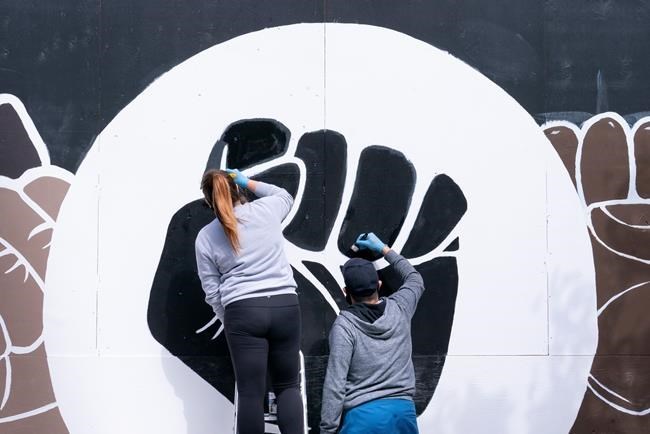
A Black Lives Matter mural is painted on a boarded up shop in Montreal, Friday, June 12, 2020. Seven in 10 Black Canadians experience racism on a regular or occasional basis, suggests a preliminary study that experts are calling a "first step" toward dismantling systemic discrimination. THE CANADIAN PRESS/Paul Chiasson
Republished May 21, 2021 - 11:30 AM
Original Publication Date May 21, 2021 - 7:58 AM
TORONTO - Seven in 10 Black Canadians have experienced racism on a regular or occasional basis, suggests a preliminary study that experts are calling a "first step" toward dismantling systemic discrimination.
Researchers at York University released early findings Friday from a national survey examining how Black Canadians experience race and racism across social spheres.
The interim report, produced in partnership with the Canadian Race Relations Foundation, draws from the responses of roughly 5,500 participants, including about 1,800 Black people, between March 21 and May 5.
Seventy per cent of Black respondentsreported facingracism regularly or from time to time, while roughly half of Indigenous people and other racialized people said the same, according to the ongoing study.
Lead author Lorne Foster said the research breaks new ground in compiling granular data on Black Canadians, in contrast to existing literature thatcombinesall racialized groups into the catch-all category of "visible minorities."
"We see this data as really the first step in dismantling systemic racism, particularly anti-Black systemic racism," said Foster, the director of York University's Institute for Social Research
"With this type of information, it's difficult now to even deny or ignore the calls from the Black community to address racism in the major sectors and institutions of our society."
Researchers blended traditional online survey techniques and new digital tools to gather a wide breadth of insights, including participant-submitted policy proposals, said Foster.
The polling industry's professional body, the Marketing Research and Intelligence Association, says online surveys cannot be assigned a margin of error because they do not randomly sample the population.
Foster said he and his team will continue to refine and expand their investigation as data collection continues through June 1.
But the initial results paint a clear and detailed picture of the extent to which anti-Black racism pervades Canada's systems of education, employment, health care, child welfare and criminal justice, he said.
Of particular concern is racism in the professional world, which Foster pointed to as a primary driver for socioeconomic disparities along racial lines.
A staggering 96 per cent of Black respondents said that racism is a problem in the workplace, including 78 per cent who saw it as a serious or very serious issue.
Moreover, 47 per cent of Black Canadians told researchers they have been treated unfairly by an employer in hiring, pay or promotion in the last year.
Some respondents told researchers that the stress and trauma of workplace racism was so severe that it resulted in mental health issues, poor morale or alienation from the workforce, said Foster.
"I recently quit my job of over 20 years, partly due to burnout brought on by discrimination," one respondent told researchers, adding that his employer didn't even acknowledge his departure with a goodbye card.
Meanwhile, 56 per cent of white participants saw racism on the job as a small problem, or not at all.
Another sector that 91 per cent of Black respondents said has a racism problem is the health-care system, and 88 per cent of Indigenous participants agreed.
The survey found that 22 per cent of Black participants said they had been unfairly stopped by the police in the previous 12 months — twice the rate of any other group.
In Atlantic Canada and British Columbia, more than two in five Black men told researchers they'd been unfairly stopped by law enforcement in the past year.
More than nine in 10 Black respondents viewed racism as a problem in their communities, and two-thirds said they had been treated with suspicion in the last year.
The COVID-19 crisis has fed into this unease, with 34 per cent Black participants expressing concern about being treated with suspicion when wearing face coverings in public.
Kimberly Bennet, the director of communications at the Canadian Race Relations Foundation, said these numbers crystallize what Black Canadians have long been saying: that racism ripples through every facet of society, and it's going to take a collective effort to address it.
"All entities need to look at how they can use this data to address policies within their companies, within their agencies or within their departments to dismantle any form of racism or discrimination that is making life more difficult for Black Canadians or people of colour in general."
This report by The Canadian Press was first published May 21, 2021.
News from © The Canadian Press, 2021